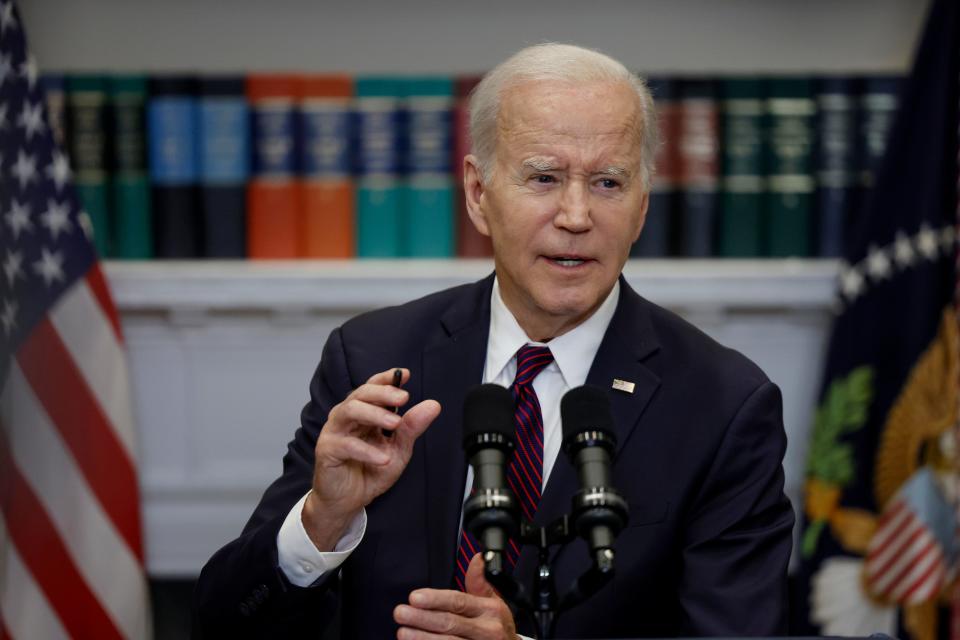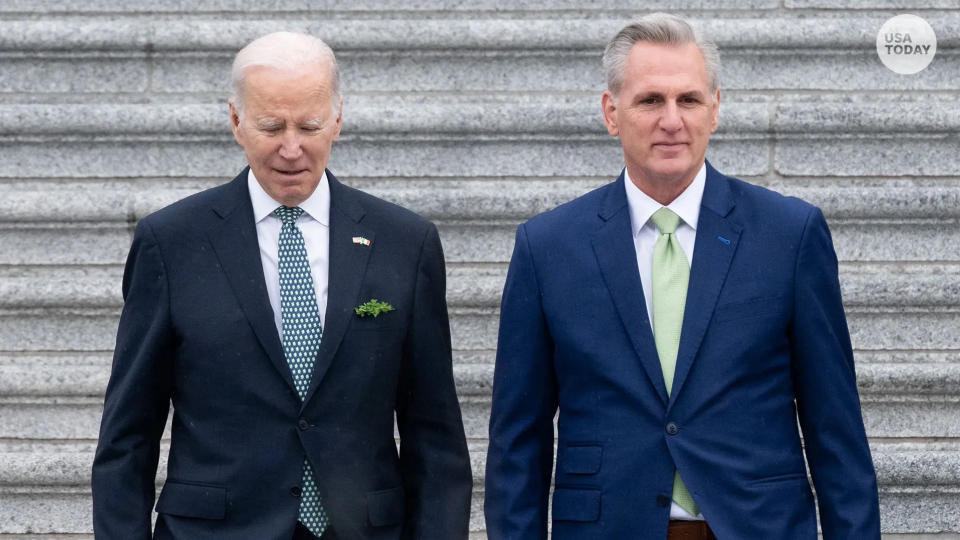Decide for yourself: What does 14th Amendment have to do with debt? Find it all in Section 4
- Oops!Something went wrong.Please try again later.
If Congress doesn't act, President Joe Biden said he has considered invoking the 14th Amendment to work around the debt ceiling and avoid a government default. However, the president has expressed concern about inviting litigation that could block the risky strategy.
With less than two weeks before the country runs out of money to pay its bills, talks have started and stopped between the White House and House Republicans over a deal to avoid a historic debt default.
If no deal is reached, Biden invoking the 14th Amendment remains a possibility, however remote. Here's what we know.
What is the text of the 14th Amendment?
Section 1: All persons born or naturalized in the United States, and subject to the jurisdiction thereof, are citizens of the United States and of the State wherein they reside. No State shall make or enforce any law which shall abridge the privileges or immunities of citizens of the United States; nor shall any State deprive any person of life, liberty, or property, without due process of law; nor deny to any person within its jurisdiction the equal protection of the laws.
Section 2: Representatives shall be apportioned among the several states according to their respective numbers, counting the whole number of persons in each state, excluding Indians not taxed. But when the right to vote at any election for the choice of electors for President and Vice President of the United States, Representatives in Congress, the executive and judicial officers of a state, or the members of the legislature thereof, is denied to any of the male inhabitants of such state, being twenty-one years of age, and citizens of the United States, or in any way abridged, except for participation in rebellion, or other crime, the basis of representation therein shall be reduced in the proportion which the number of such male citizens shall bear to the whole number of male citizens twenty-one years of age in such state.
Section 3: No person shall be a Senator or Representative in Congress, or elector of President and Vice-President, or hold any office, civil or military, under the United States, or under any State, who, having previously taken an oath, as a member of Congress, or as an officer of the United States, or as a member of any State legislature, or as an executive or judicial officer of any State, to support the Constitution of the United States, shall have engaged in insurrection or rebellion against the same, or given aid or comfort to the enemies thereof. But Congress may by a vote of two-thirds of each House, remove such disability.
Section 4 : The validity of the public debt of the United States, authorized by law, including debts incurred for payment of pensions and bounties for services in suppressing insurrection or rebellion, shall not be questioned. But neither the United States nor any State shall assume or pay any debt or obligation incurred in aid of insurrection or rebellion against the United States, or any claim for the loss or emancipation of any slave; but all such debts, obligations and claims shall be held illegal and void.
Section 5: The Congress shall have the power to enforce, by appropriate legislation, the provisions of this article.

What is the 14th Amendment, simplified?
The 14th Amendment, which was ratified in 1868 after the Civil War, is best known for bestowing citizenship to former slaves as well as the privileges that come along with it, including equal protection under the law and the right to due process.
14th Amendment: Biden weighs invoking it to avoid default; McConnell warns against it
What does the 14th Amendment have to do with debt?
Section 4 of the 14th Amendment says the "validity of the public debt of the United States ... shall not be questioned."
Some constitutional scholars argue if Congress fails to raise the debt ceiling, which sets a limit on how much the U.S. can borrow, Biden has the authority to have the Treasury Department continue to pay debts without Congress taking any action.

What is the Biden administration considering?
While Biden has considered employing the 14th Amendment to circumvent Congress if it fails to raise the debt ceiling, it appears unlikely he will do so.
Politico reported on May 19 that Biden recently told progressive Democrats who had urged him to bypass Congress that he does not see a solution without Congress, saying that it would be legally complicated and bad for the economy.
What is the deadline to raise the debt ceiling?
The U.S. could run out of money to pay its debts as early as June 1, U.S. Treasury Secretary Janet Yellen has said.
Who does the United States owe money to?
The U.S. owes about one-third of its debt to foreign countries, with the governments of Japan and China being owed the most. Another one-third of the debt is money the government has borrowed from itself, from various funds that have supplemental income beyond what is being currently used, such as the Social Security Trust Fund. The final one-third of the debt is owed to state and local governments and other large stakeholders like the Federal Reserve, banks and U.S. Treasury bondholders.
Tara Kavaler is a politics reporter at The Arizona Republic. She can be reached by email at tara.kavaler@arizonarepublic.com or on Twitter @kavalertara.
This article originally appeared on Arizona Republic: How the 14th Amendment relates to Biden-McCarthy debt ceiling debate

